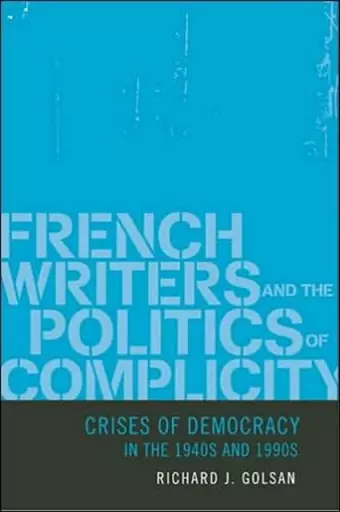French Writers and the Politics of Complicity
Crises of Democracy in the 1940s and 1990s
Format:Hardback
Publisher:Johns Hopkins University Press
Published:14th Feb '06
Currently unavailable, and unfortunately no date known when it will be back

Golsan sets out to explore the motives, consequences, and implications of political complicity during two periods of twentieth-century French history. Each of the six case studies of Montherlant, de Chateaubriant, Giono, Debray, Finkielkraut, and Courtois raises a different set of questions, providing a wide-ranging view of French cultural politics. Golsan's knowledge of the periods in question is extensive and his scholarship is impeccable: well documented, well reasoned, fully contextualized, elegantly and clearly expressed. -- Lynn Higgins, Dartmouth College
Considered together, these six intellectuals serve as sobering reminders that political commitments are never as simple or straightforward as they seem and that admirable motives for political involvement can have dangerous and destructive consequences in historical practice.Focusing on the political commitments of three French writers who collaborated with the Vichy Regime and Nazi Germany during World War II, and on those of three leading French intellectuals of the 1990s whose misplaced political idealism led them to support xenophobic, authoritarian regimes and dangerous historical revisionisms, Richard J. Golsan reexamines the notion of political commitment or engagement in two difficult periods in modern French history. Discussing the fiction, essays, and journalism of Henry de Montherlant, Jean Giono, and Alphonse de Chateaubriant, Golsan explores the complexity of artistic and intellectual collaboration during the German Occupation. He demonstrates that, in this context, complicity with political evil often derived from "nonpolitical" motives including sexual orientation, antimodern aesthetics, and dangerously skewed religious beliefs. Turning to the post-cold war era of the 1990s, Golsan examines the philosopher Alain Finkielkraut's support for Croatian independence, the "mediologist" Regis Debray's pro-Serb stance during the bombing of Kosovo, and the historian Stephane Courtois's revisionist comparison of Nazi and Communist crimes during the 1997 debate surrounding the publication of The Black Book of Communism. In these three cases, laudable motives-and misguided historical comparisons with Vichy, Nazism, and the Occupation period that marked the political and intellectual discourses of France in the 1990s-resulted, paradoxically, in antidemocratic engagements profoundly at odds with the original motivations behind these intellectuals' commitments. In each of these case studies, political complicity derives from a combination of passions and ideals-whether positive or negative, emotional or intellectual-as well as a desire to make the present conform to a particular and generally skewed vision of the past. The full implications of these involvements are neither fully grasped nor understood by their authors, either through lack of objectivity, rationality, or imagination or through willful ignorance. The results are always unfortunate and often disastrous. Considered together, these six intellectuals serve as sobering reminders that political commitments are never as simple or straightforward as they seem and that admirable motives for political involvement can have dangerous and destructive consequences in historical practice.
Golsan provides crucial lessons on both the necessity and the dangers of political action. Choice 2006 His intellectual honesty, scrupulous commitment to critical fairness, and determination 'to avoid the twin dangers of demonization and apology' places him at the antipodes of the partisan ideologues whose blindness and complicity with evil he documents in a dispassionate, elegant, and compelling voice. H-France 2007 Golsan's fine essays are a window into twentieth-century French intellectual life. -- Donald Reid International History Review 2007 Golsan's ideas are closely argued throughout and cast interesting new light. -- Angela Kimyongur Modern Language Review 2007 An intriguing contribution to the ongoing debates on the past and the present state of the French Republic of Letters. -- Thomas Nolden Shofar 2007 A thought provoking and well-researched new book... Will appeal to a broad audience of scholars, especially those interested in the major currents of French intellectual history. -- Andrew Sobanet Substance 2009
ISBN: 9780801882586
Dimensions: 229mm x 152mm x 18mm
Weight: 431g
216 pages